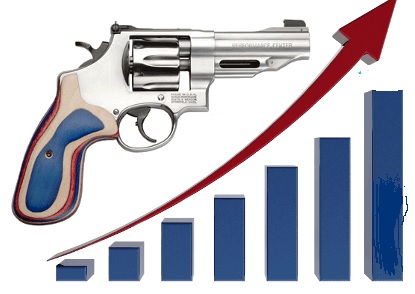Pointing down `barrel of death` indicator in global gun crime v ownership debate
Gun sales in the US hit a record high last year with ownership doubling during President Barack Obama`s two terms in office, according to the country`s top law enforcement agency.
Gun sales in the US hit a record high last year with ownership doubling during President Barack Obama`s two terms in office, according to the country`s top law enforcement agency.
Background checks conducted by the FBI, which correlates with gun sale estimates, soared by a fifth to more than 27 million.
The four million increase on the 2015 figure to 27,538,673 does not include many guns privately sold or given to friends and family members.
More guns were sold on November 25, 2016 dubbed Black Friday than on any other day in US history, according to the National Rifle Association.
The FBI processed 185,713 background checks through their National Instant Criminal Background Check System breaking the record by about 400. The checking climaxed in the afternoon at three per second.
The spike in gun sales came in a year dominated by rising fears of international terrorism on US soil and the original anticipation of a Hillary Clinton presidency, which was expected to lead to tighter restrictions on firearms.
And a spate of extremist attacks in 2016 punctured the security cordon in both Europe and the US.
So-called Islamic State (Daesh) atrocities hit Paris, Nice, Brussels and Berlin while America`s most deadly mass shooting saw 49 killed and 53 injured at a nightclub in Orlando, Florida.
The FBI data showed that gun sales surged shortly after President Obama originally took office in 2008. But the increase pales in comparison to the 2016 surge with overall ownership rising by around 100 per cent during his time at the White House, according to The Washington Examiner.
Gun rights have been a hot topic throughout the Obama presidency with critics claiming that he would clamp down on Second Amendment rights by restricting sales and levying tighter purchasing requirements.
The fears proved groundless and the contrast between the US and other civilised countries could not be starker.
Japan has one of the lowest rates of gun crime in the world, allied to low weapon ownership.
In 2014, there were just six gun fatalities, compared to 33,599 in the United States.
How do they achieve such results? Well, handguns are banned outright in Japan. Only shotguns and air rifles are allowed.
The law restricts the number of gun shops to a maximum of three in any of Japan`s 43 administrative regions. Fresh cartridges can only be obtained by returning the spent ones bought on the last visit.
Police forces must be notified where the gun and the ammunition are stored, and they must be kept separately under lock and key.
The current gun control law was introduced in 1958, but the policy dates back centuries.
“Ever since guns entered the country, Japan has always had strict gun laws,” says Iain Overton, executive director of Action on Armed Violence and the author of Gun Baby Gun.
“It was the first nation to impose gun laws in the whole world and I think it laid down a bedrock saying that guns really do not play a part in civilian society,” he added.
The result is a very low level of gun ownership 0.6 guns per 100 people in 2007, according to the Small Arms Survey, compared to 6.2 in England and Wales and 88.8 in the US.
“The moment you have guns in society, you will have gun violence but I think it`s about the quantity,” said Mr Overton. “If you have very few guns in society, you will almost inevitably have low levels of violence.”
People were being rewarded for giving up firearms as far back as 1685, a policy Mr Overton describes as “perhaps the first ever gun buyback initiative”.
Japanese police officers rarely use guns and put much greater emphasis on martial arts. More time is spent practising the ancient art of kendo, using bamboo swords, than learning how to use firearms.
The response to violence is never violence, but “always to de-escalate it”, says journalist Anthony Berteaux.
Only six shots were fired by Japanese officers nationwide in 2015.
“What most Japanese police will do is get huge futons and essentially roll up a person who


